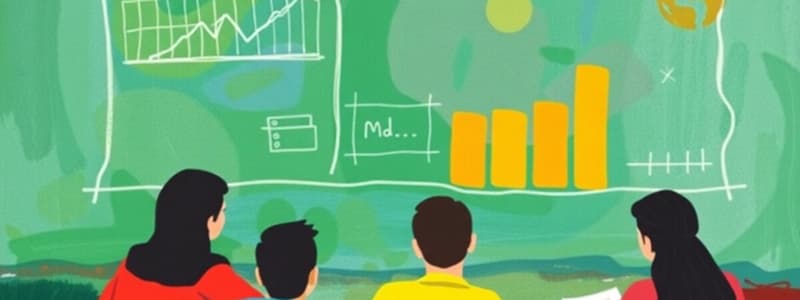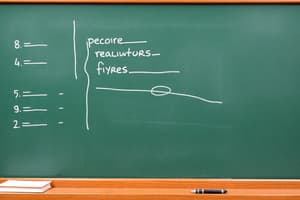Podcast
Questions and Answers
What is one of the perspectives that teachers have on assessment?
What is one of the perspectives that teachers have on assessment?
- To influence future study habits
- To track their child's academic progress
- To motivate students and hold them accountable (correct)
- To experience anxiety and stress
How do students perceive assessment?
How do students perceive assessment?
- As non-essential to their learning
- As a way to influence their self-esteem (correct)
- As a method for teachers to guide instruction
- As a primary means of school accountability
Parents track their child's academic progress to identify areas for improvement.
Parents track their child's academic progress to identify areas for improvement.
True (A)
What do administrative areas use assessment for?
What do administrative areas use assessment for?
Students experience _____ and stress during assessments.
Students experience _____ and stress during assessments.
Match the perspectives with the corresponding actors:
Match the perspectives with the corresponding actors:
Which of the following is part of Standard 7 regarding teaching practices?
Which of the following is part of Standard 7 regarding teaching practices?
Evaluation criteria should not reflect the learning objectives.
Evaluation criteria should not reflect the learning objectives.
What is the primary purpose of assessment?
What is the primary purpose of assessment?
Who participates in the creation of Evaluation Rules?
Who participates in the creation of Evaluation Rules?
What does feedback in education promote?
What does feedback in education promote?
Assessment is a group of activities led by professional educators to obtain information about students' _____ process.
Assessment is a group of activities led by professional educators to obtain information about students' _____ process.
Match the following standards with their focus areas:
Match the following standards with their focus areas:
What is required for a student to transition to a higher academic level?
What is required for a student to transition to a higher academic level?
Flashcards are hidden until you start studying
Study Notes
Perspectives on Assessment
-
Teachers' Role
- Use assessments to guide and enhance instructional methods.
- Measure overall student learning at the end of units or grading periods.
- Aim to motivate students, hold them accountable, and establish learning objectives.
- Reflect on teaching effectiveness and adapt strategies based on student performance.
-
Students' Experience
- View assessments as opportunities to demonstrate understanding of the material.
- Affects self-esteem, motivation, and future study habits.
- May experience anxiety and stress related to evaluation processes.
- Prefer assessments that are perceived as fair, clear, and aligned with coursework.
- Engage better with assessments that are interactive, relevant, and connected to real-life applications.
-
Tutors/Parents' Involvement
- Monitor their child's academic progress to identify improvement areas.
- Seek ways to support their children at home and communicate with teachers about concerns.
- Assessment outcomes can reflect future success or failure, increasing pressure on students.
- Collaborate with educators to influence their child's learning experience positively.
-
Administrative Area's Perspective
- Hold teachers and schools accountable for student performance and curriculum alignment.
- Guide decisions on resource allocation, professional development, and school improvement strategies.
- Benchmark and compare school performance against standards and expected outcomes.
Assessment and Feedback Definitions
- Marco para la Buena Enseñanza (MBE) provides a framework for effective teaching and assessment targeting teachers and pre-service teachers.
Standard 7: High Expectations
- Standards 7.1-7.4 emphasize boosting student confidence through clear communication of objectives and instructions.
- Standards 7.5 focuses on communicating learning objectives and assessing student understanding from the start.
- Standards 7.6 highlight giving clear instructions and checking for understanding during the learning process.
- Standards 7.7 involves identifying misconceptions and connecting previous knowledge with new concepts through activities like exit tickets.
- Standards 7.8 stress the importance of presenting content throughout the lesson to maintain engagement.
- Standards 7.9-7.11 encourage the use of diverse resources to promote active student participation.
- Standard 7.12 advocates for the diversification of teaching practices to cater to different learning styles.
Standard 9: Evaluation and Feedback
- Standard 9.1 requires teachers to clearly explain evaluation criteria aligned with learning objectives and involve students in defining performance expectations.
- Standard 9.2 emphasizes the continuous check of student comprehension and addressing weaknesses during class.
- Standard 9.3 involves using assessment results to tailor teaching methods to meet student needs.
- Standard 9.4 stresses the importance of providing timely descriptive feedback to students to enhance learning.
- Standard 9.5 underlines the need to communicate grades to help students set learning goals.
- Standard 9.6 focuses on strategies to preserve students' self-esteem and encourage perseverance in learning.
- Standard 9.7 guides students on using criteria for self and co-assessment for self-awareness in their learning journey.
- Standard 9.8 encourages students to propose achievement indicators during group work, fostering collaborative assessment.
Administrative Functions
- Administrative staff are responsible for diagnosing teachers' training needs in assessment and feedback practices.
Teaching and Evaluation Standards
- Estándares de la Profesión Docente outline essential competencies for teaching, assessing, and treating students.
- Standard A mandates achieving a C1 level of English proficiency with skills in creating evaluation items across receptive and productive language use.
- Standard B emphasizes key qualities of assessment: validity, reliability, authenticity, and washback effects.
- Standard C calls for self-reflection on teaching practices.
- Standard D focuses on understanding students' thought processes.
- Standard E incorporates different types of assessments: formative, summative, and diagnostic.
Assessment Frameworks: Decreto 67 & 83
-
Decreto 67 defines assessment as activities led by educators to obtain information about student learning, which informs feedback and pedagogical decisions.
-
Grading involves assigning scores or symbols to represent student performance and learning progress.
-
Promotion requires completing a level for advancement; failure results in retaking the entire level.
-
The creation of evaluation rules involves input from teachers, administrative staff, and the school community.
-
Decreto 83 promotes equality and social justice by advocating for fair treatment and opportunities for all students.
-
Ensures curricular adjustments for special needs students to guarantee fair access and progress toward essential learning objectives.
-
Assessment is integral to the teaching-learning process, providing insights into student characteristics and their learning progress, enabling targeted support.
-
Assessment planning encourages collaboration among teachers and professionals to enhance educational outcomes.
Studying That Suits You
Use AI to generate personalized quizzes and flashcards to suit your learning preferences.




